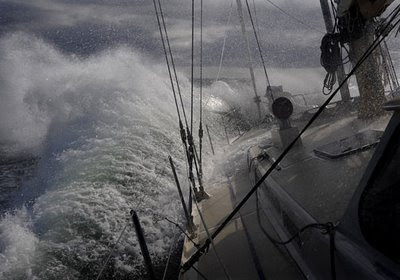
Monday, June 15 Hoonah, Alaska
Sitting at the dock in Hoonah, AK, after a short run yesterday from Juneau. "Hoonahlulu" as we are calling it is a little, mostly native, fishing village on Chichigof Is. It will be the last stop before Dutch Harbor. Our scientist, Micheal Reynolds, has his probe in the water this morning taking multiple readings in the harbor, including acoustic measurements. Not much for sun/cloud info today as it is overcast and raining. Captain Schrader shared some wonderful stories last night from his solo days, especially from the Falkland Islands where he had a magnificent adventure in a time of war and conflict.
Tuesday, June 16 Gulf of Alaska
Making our crossing of the Gulf now on our way to Dutch Harbor. About 1000 miles from the little "hobbit" town of Elfin Cove where wooden boardwalks wind around the entire town and you have a constant feeling of being in someone's living room. We departed from this funny little hamlet into Cross Sound at 0700 and are now some 100+ miles off the coast.
The weather cleared and we could clearly see the Glacier Bay wilderness in the distance and then at over 60 miles offshore, the majestic St Elias Mountain range popped up above the clouds. At 19,551 feet, Mount Logan anchors this remote coastal range. Glassy seas and little wind. Ocean Watch motors along this evening looking for some clear skies and lot of stars on a moonless night.
Thursday, June 18 Gulf of Alaska
Happy Birthday Mom! Miss you, sailing the blue waters of Okoboji, all my great friends and loved ones.
Friday, June 19 Gulf of Alaska
Now 450 miles as the crow flies to Dutch Harbor. Should be in Monday morning. Long slog through these waters. Confused sea yesterday after some really good sailing Wednesday. Miles pass, days fade, discussions come and go. Drifting into more science today and the carbon "sink" we are sailing through which is the northern Pacific and Gulf of Alaska where the waters are more acidic (less basic) than the world average. This is an important function of the world's seas and oceans as a "sink" but they are being overwhelmed by the shear amount of carbon in the atmosphere to absorb. See my blog on the AtA site on 6/20.
Saturday, June 20 Gulf of Alaska
The Gulf is kicked up. Right in our face. Just took the second reef and it was messy. Night, dark, dangerous. All of the above. About 175 miles east of the Shumagin Island group, then another 175 to the cut at Unimak Pass.
Sunday, June 21 Gulf of AK
Happy summer solstice. Funny how I have wished this from the north a few times, cold lonely places far away. But in these places there is discovery. We are crossing Cloud Nine's rumb line from a couple years ago. Dutch Harbor Seems an eternity away. 2200- later, things have settled down. Problem is still wind on our nose. Cooling off too. Now 5.5 C. Starting to look for Shishaldin Volcano, 9500' of wow.
Monday, June 22 Unimak Island, AK
Found Shishaldin and its mate, Isanotski Peak. These are amazing formations along the Aleutian Islands. You almost expect them to blow at any time. Shishaldin is a perfect cone volcano. Alaska has 10% of the world’s earthquakes and is situated on the "ring of fire." I remember this area well and use the image I took two years ago in my presentations on climate change.
Tuesday, June 23 Dutch Harbor, AK
We made it! 0230 hrs arrival. Back at the commercial fishing dock where Cloud Nine was two years ago after finding no room in the small boat harbor. Made a bit of a toast together at 0330. A long, long sail across the Gulf against the grain. 1100 miles. Big milestone here folks. We can now go north and set the table for the NW Passage. Got in the bunk at 0400. Sleep came easy. Lot's to do now in Dutch. Science lecture and slideshow tonight to begin. First, breakfast and shower, not necessarily in that order. Look for photos and twitter feeds... Happy to be here.










